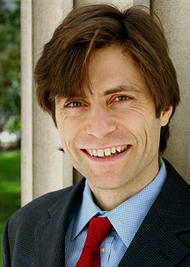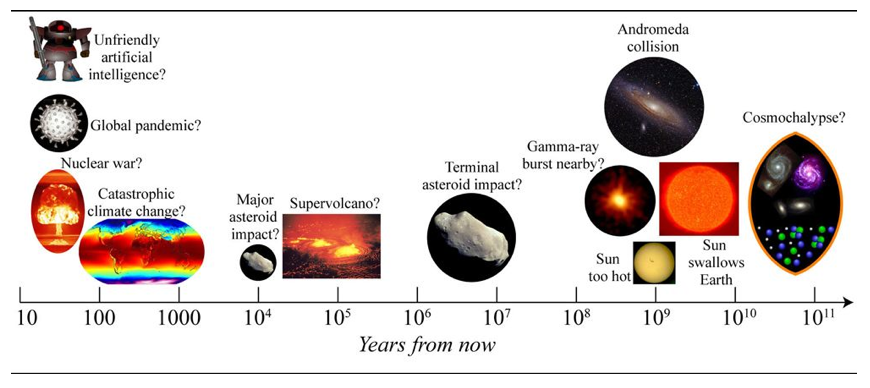 Known as “Mad Max” for his unorthodox ideas and passion for adventure, his scientific interests range from precision cosmology to the ultimate nature of reality, all explored in his new popular book “我们的数学宇宙“. He is an麻省理工学院物理学教授拥有超过两百的技术论文,12篇引用超过500次,并以几十个科学纪录片为特色。他与SDSS在Galaxy Clustering上的合作共同分享了科学杂志的一等奖“今年的突破:2003年”。
Known as “Mad Max” for his unorthodox ideas and passion for adventure, his scientific interests range from precision cosmology to the ultimate nature of reality, all explored in his new popular book “我们的数学宇宙“. He is an麻省理工学院物理学教授拥有超过两百的技术论文,12篇引用超过500次,并以几十个科学纪录片为特色。他与SDSS在Galaxy Clustering上的合作共同分享了科学杂志的一等奖“今年的突破:2003年”。
卢克Muehlhauser: Your book opens with a concise argument against theabsurdity heuristic— the rule of thumb which says “If a theory sounds absurd to my human psychology, it’s probably false.” You write:
Evolution endowed us with intuition only for those aspects of physics that had survival value for our distant ancestors, such as the parabolic orbits of flying rocks (explaining our penchant for baseball). A cavewoman thinking too hard about what matter is ultimately made of might fail to notice the tiger sneaking up behind and get cleaned right out of the gene pool. Darwin’s theory thus makes the testable prediction that whenever we use technology to glimpse reality beyond the human scale, our evolved intuition should break down. We’ve repeatedly tested this prediction, and the results overwhelmingly support Darwin. At high speeds, Einstein realized that time slows down, and curmudgeons on the Swedish Nobel committee found this so weird that they refused to give him the Nobel Prize for his relativity theory. At low temperatures, liquid helium can flow upward. At high temperatures, colliding particles change identity; to me, an electron colliding with a positron and turning into a Z-boson feels about as intuitive as two colliding cars turning into a cruise ship. On microscopic scales, particles schizophrenically appear in two places at once, leading to the quantum conundrums mentioned above. On astronomically large scales… weirdness strikes again: if you intuitively understand all aspects of black holes [then you] should immediately put down this book and publish your findings before someone scoops you on the Nobel Prize for quantum gravity… [also,] the leading theory for what happened [in the early universe] suggests that space isn’t merely really really big, but actually infinite, containing infinitely many exact copies of you, and even more near-copies living out every possible variant of your life in two different types of parallel universes.
像现代物理学一样,假设motivatingMIRI’s work can easily run afoul of a reader’s own absurdity heuristic. What are your best tips for getting someone to give up the absurdity heuristic, and try to judge hypotheses via argument and evidence instead?
最大Tegmark.: That’s a very important question: I think of the absurdity heuristic as a cognitive bias that’s not only devastating for any scientist hoping to make fundamental discoveries, but also dangerous for any sentient species hoping to avoid extinction. Although it appears daunting to get most people to drop this bias altogether, I think it’s easier if we focus on a specific example. For instance, whereas our instinctive fear of snakes is innate and evolved, our instinctive fear of guns (which the Incas lacked) is learned. Just as people learned to fear nuclear weapons through blockbuster horror movies such as “The Day After”, rational fear of unfriendly AI could undoubtedly be learned through a future horror movie that’s less unrealistic than Terminator III, backed up by a steady barrage of rational arguments from organizations such as MIRI.
In the mean time, I think a good strategy is to confront people with some incontrovertible fact that violates their absurdity heuristic and the whole notion that we’re devoting adequate resources and attention to existential risks. For example, I like to ask why more people have heard of Justin Bieber than of Vasili Arkhipov, even though it wasn’t Justin who singlehandedly prevented a Soviet nuclear attack during the Cuban Missile Crisis.
卢克:在审查主流当代物理后,您开始解释“多层举重“在第6章中,这是指我们可能居住的四个”级别“。“我的级别多层”,因为你称之为“,是对目前早期宇宙最广泛接受的理论的最广泛理论的不可避免的预测永恒通货膨胀): the universe is infinite in all directions, implying that there is an identical copy of me, who is also asking Max Tegmark questions via email, roughly 101029.从我现在坐在哪里米。
To many readers that will sound absurd. But you write that it is “a prediction of eternal inflation which, as we’ve seen above, agrees with all current observational evidence and is implicitly used as the basis for most calculations and simulations presented at cosmology conferences.” Moreover, the Level I multiverse could still exist even if eternal inflation turns out to be false. All we need for the Level I multiverse is, you write:
- 无限空间和物质: Early on, there was an infinite space filled with hot expanding plasma.
- Random seeds:早期,一个机制操作,使得任何地区都可以接受任何可能的种子波动,看似随意。
当您解释时,我们对这两个索赔具有相当体面的证据,独立于尤其是否恰好是正确的。
尽管如此,我觉得你们在世界各地的物理部门的同事都会想到这一点。如果你不得不猜到,他们的比例是接受我多层的水平是对永恒通胀的直接预测?并且大致比例,他们认为永恒的通货膨胀或sometheory that assumes both “infinite space and matter” and also “random seeds”, will turn out to be correct?
最大限度: There’s definitely been an increased acceptance of these ideas, with the most vocal critics shifting from saying “this makes no sense and I hate it!” to “I hate it!”, tacitly acknowleding that it’s actually a scientifically legitimate possibility.
I haven’t seen any relevant poll, but my sense is that the proportion of physicists who think a Level I multiverse is likely depends strongly on their subfield of physics, with the proportion being highest among theoretical cosmologists and high-energy theorists, and lowest in very different areas where people don’t normally think much about these ideas and often feel that they sound too weird to be true.
你和你的Miri同事很难努力是理性的,所以如果你相信A意思是B和A是真的,那么你会在确信之前更新你的贝叶斯,因为B也是如此。I suspect that many physicists are less rational than you: my guess is that many who are sympathetic toward inflation and learn that it generically implies eternal inflation and Level I don’t actually update their prior about Level I, but instead tell themselves that a multiverse feels unscientific, and therefore lose interest in spending more time thinking about consequences of inflation.
卢克: You go on to explain four levels of multiverse in total:
- 级别我多才:“目前但不是永远不可观察的空间的遥远地区;它们具有相同的有效物理法律,但可能有不同的历史。“直接预测永恒通胀,以及宇宙演化的许多其他可能的理论。
- 第II级多层:“永远是不可观察的空间的遥远地区,因为这里的空间和保持膨胀;他们遵守相同的物理法律,但他们的有效物理法律可能有所不同。“也提出了永恒的通货膨胀。
- Level III multiverse: “Different parts of quantum Hilbert space.” If the wavefunction never collapses but is insteadalwaysgoverned by the Schrödinger equation, this implies the universe is constantly “splitting” into parallel universes.
- IV级多层次:“所有数学结构,对应于不同基本的物理定律。”
- 在我们到达IV级之前,我想问一下你对III级的主张。
You write that “fledgling technologies such as quantum cryptography and quantum computing explicitly exploit the Level III multiverse and work only if the wavefunction doesn’t collapse.”
But I assume that collapse theorists don’t think their view will be falsified as soon as the first “true” quantum computer is (uncontroversially)建造。他们在回应中争论什么?为什么你认为量子计算只能在波飞行功能没有崩溃的情况下工作?
最大限度:这是一个很好的问题,因为这个领域有很多困惑。什么是无争议的是量子计算机将要工作它没有崩溃,即,如果Schrödinger方程没有任何例外情况(只要可以克服诸如制剂缓解的工程障碍)。有什么争议是否则发生的事情。有这么大的动物园非埃弗雷特解释(13 by now) that you’ll have to ask their adherents what exactly they predict for quantum computers, for quantum systems containing humans, etc. – in my experience, different people claiming to subscribe to the same interpretation sometimes nonetheless disagree on specific predictions.
Quantum Litmus测试是提出以下问题:
爱丽丝在宇宙飞船中的一个孤立的实验室中,测量叠加“上升”和“下”的电子旋转。据尚未观察到宇宙飞船的鲍勃说,爱丽丝的大脑是一种叠加的思想,她认为她正在衡量“Up”,她正在衡量“下来”?
许多世界的解释说,令人遗憾的是“是”,因为这就是施罗丁方程的预测。一些哥本哈根支持者会说“否”,在观察电子时,爱丽丝在观察到电子邮件时会折叠:真正随机发生的事情发生在那个瞬间,现在真的很愚蠢或真正刚刚下降。其他人说“是”,其他人会给你减少清晰的答案。我的观点是,一个理论拒绝明确预测薛定液对任意的大型和复杂系统是自动拒绝预测任意大型和复杂的量子计算机是否工作,因此不是完整的理论亚博体育苹果app官方下载。我还争辩说,任何那些波飞的理论,那些波飞倒塌的理论就是Everett伪装成不熟悉的语言 - 就大自然而言,它只是重要的等式。
卢克:在第11章你写下:
而我的大多数物理学同事都会说我们的外部物理现实是(至少大约)describedby mathematics, I’m arguing that itis数学(更具体地,数学结构)。换句话说,我正在制作一个强大的索赔。为什么?...如果未来的物理教科书包含一切令人垂涎的一切(脚趾),那么其等式是对外部物理现实的数学结构的完整描述。我在写is而不是对应到这里,因为如果两个结构是等效的,那么没有意义的意义,它们不是一个和同样的......
您是否有担任外部现实存在的物理同事,并且可以由数学描述,但是谁别接受你的数学宇宙假设?如果是这样,他们的反参数是什么?
最大限度:有趣的是,我还没有听到物理同事的任何明显表达的反击。Rather, it’s a bit like with the unfriendly AI X-risk argument: the scientists I know who are unconvinced by the conclusion don’t take issue with specific logical steps in the argument, but lack sufficient interest in the question to have familiarized themselves with the argument.
如果您想对人们的观点进行分类,它将归结为两个逻辑上单独的问题:
- Is our external physical reality completely described by mathematics?
- 可以通过数学完美描述的东西(除了数学属性之外没有属性),但仍然不是数学结构?
The people I’ve heard answer “no” to 1) tend to do so not based on evidence or a logical argument, but based on a preference for a non-mathematical free will, soul or deity. The people I’ve heard answer “no” to 2) often conflate the description with the described, within mathematics itself. This ties in with the important question about whether mathematics is invented or discovered – a famous controversy among mathematicians and philosophers.
Our语言用于描述地球海王星(我们显然发明 - 我们在瑞典语中发明了一个不同的词)当然是不同于我们发现的地球本身的不同。类似地,我们人类发明了语言of mathematics (the symbols, our human names for the symbols, etc.), but it’s important not to confuse this language with the结构我专注于书中的数学。例如,对柏拉图固体感兴趣的任何文明都会发现,恰好有5个这样的结构(四面体,立方体,八面体,十二锭和Icosahedron)。而他们可以自由发明他们想要的任何名字,他们是他们不是自由发明第6次 - 它根本不存在。它处于同样的意义:发现在现代物理学中流行的数学结构,而不是发明,而不是从3 + 1维伪riemannian歧管到希尔伯特空间。我在书中探索的可能性是其中一个结构of mathematics (which we can discover but not invent) corresponds to the physical world (which we also discover rather than invent).
卢克: In chapter 13 you turn your attention to the future of physics, and the future of humanity within the physical world. In particular, you talk a lot about risks of human extinction, aka “存在主义risks。”
To summarize: the bad news is that there are lots of ways for humans to go extinct. The good news is that very few extinction risks are remotely likely in the next, say,150 years。To illustrate this point, you provide this graphic:

我喜欢那个图形,我认为它基本上是对的,除了:
- I’d downplay nuclear war as a fully存在主义风险(参见here),
- 我会改变“全球大流行”到“综合生物学”,强调它是小说pathogens that might be capable of full-blown human extinction (rather than “mere” global catastrophe),
- and I’d addmolecular nanotechnology作为未来150年的主要存在威胁。
I suspect the folks at Cambridge University’s存在风险研究中心(CSER) would make the same adjustments, as they also似乎是专注于来自合成生物学,分子纳米技术和AGI的风险。
Do you think you’d agree with those adjustments, or is your basic picture somewhat different from mine on those points?
最大限度:我同意,“合成生物学”是一个更好的phrase, especially since the global pandemics I had in mind when making that figure were mainly human-made. The forms of molecular nanotechnology that I suspect pose the greatest existential risks are those that transcend the boundaries with synthetic biology or AI (already covered).
我不同意我们过度估计的核战争作为存在风险的论点。当然,全面的核战争无法通过从字面上吹嘘我们来立即杀死所有人类。然而,我发现你引用令人信服的据说令人放心的论据,去年与其中一位作者争取了这一点。为了符合存在的风险,我们不需要证明它将要extinguish humanity – we simply need to establish reasonable doubt of the assertion that it不能。
如果初始爆炸禁用我们大部分基础设施,然后核冬季将在北美,欧洲和亚洲大部分(36°F)降低夏季温度约20°C(36°F)(按照罗克斯造成灾难性的crop failures, it’s not hard to imagine scenarios of truly existential proportions. Modern human society is a notoriously complex and hard-to-model system, so the scenarios I’m most concerned about involve complex interplays between multiple effects. For example, infrastructure breakdown might make it difficult to control either starvation-induced pandemics or armed gangs who systematically sweep the planet for food, weapons, etc. with little regard for sustainability. Without any serious attempts to model such complications, I don’t find the cited estimates of available biomass etc. particularly reassuring.
卢克: 作为Bostrom(2013)不是es, humanity seems to be investing much more effort into (e.g.) dung beetle research than we are investing in research on near-term existential risks and how we might mitigate them. From your perspective, what can we do to cause research grantmakers (e.g. the NSF) and researchers (e.g. economists) to direct more of their effort toward research into near-term existential risks, especially the risks from novel technologies like synthetic biology and AGI?
最大限度: We need to draw more attention to these risks, so that people start thinking of them as real threats rather than science fiction fantasies. Organizations such as MIRI are an invaluable step in this direction.
我们应该旨在让更多意见领导者了解Xrisks,并使更多人们理解Xurisks达到舆论领导者。
卢克: Thanks, Max!
你喜欢这篇文章吗?You may enjoy our otherConversations帖子,包括: